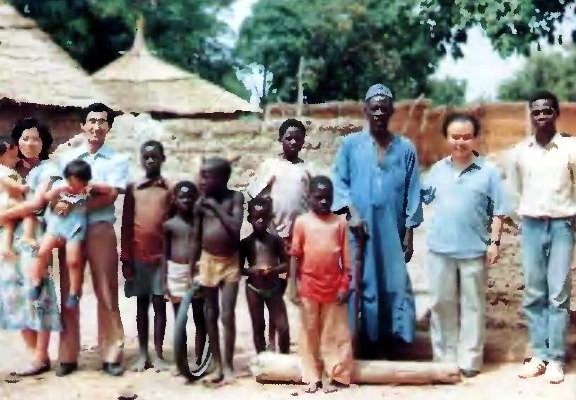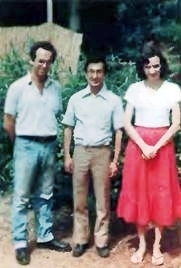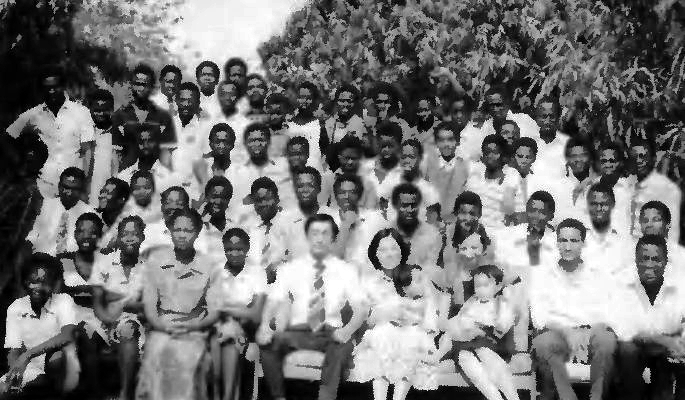![]()
The Words of the Ito Family
|
|
The Words of the Ito Family |

During
his visit in July 1983 Mr. Sudo poses between a blessed member,
Harouna, and the young man's father.
Soon after the coup of August 1983, we said goodbye to each other in our mission country of Burkina Faso for the last time. Charles, the American brother, had his mission changed to the Ivory Coast and Kathryn, our German sister, went to Zaire to join her husband there.
We could not easily separate without heartfelt tears. It was especially difficult for Charles and Kathryn to leave the country where they had poured out their sweat and tears during the whole of their twenties.
Kathryn loved Burkina Faso so much. She had lived in the country almost ten years, and that was the longest she had stayed in any country, even her native Germany, because her father was in the diplomatic service and they had moved around a great deal.
We were the original three missionaries and we had stayed together for nine years and a few months. That must be some kind of record! I must admit that our love and unity had not always been so strong.
When I originally received my mission assignment in Tokyo in February 1975, I heard the name Upper Volta for the first time in my life. I knew that I was going to a poor country (the per capita income was about $100 at that time), but I felt that because of the people's hardship, God's blessing on the country could be very great. I started out my new mission with much hope.
But I found my first difficulty was not with the physical environment of the country -- the climate, the food, or the language. It was a problem of unity with the other missionaries. I was obliged to live face to face with the Occidental culture and I couldn't escape from the situation. Kathryn was young at the time and she was rather spiritual, but she had a pure mind and she was always obedient. Charles, the American brother was, well... very, very American.
We had our horoscopes done in both the Western and the Oriental manner, and found that we should harmonize quite well. But reality was a different thing altogether.
Once Rev. Kwak visited us and said, "You three are each special extreme types of characters. This means you must study and learn from each other and your situation will become better." But we couldn't, and the indemnity course of our personal struggles continued through four or five years.
During our difficult moments we tried to overcome by talking about our different ways of thinking, our different customs, and our own lives of faith with each other. Through this process I began to understand that the only solution is to have a parental heart. The unity problem was, in fact, our heavenly training ground to help restore our parental hearts, to serve as indemnity for some of our fallen nature, and to make us international citizens.
When we first arrived, our American brother tried to open a restaurant, but it failed miserably. We understood his struggles and I prayed very deeply for him. Then Charles began selling pizza, Jewish bread, and sausage to European clients. He persisted through several months of bouts with hepatitis, and he and Kathryn began breaking through by selling the food door-to-door to white clients. It finally became a good business and the members who later joined could inherit this economic foundation.
In 1980 Charles started a photo business after five years of preparation. I am proud to say it is a great success, and it is the only color photo studio in the whole country.
Kathryn devoted herself almost entirely to witnessing. She has been faithfully developing her home church area since 1980 and has had many contacts; but it is only since the beginning of this year that real results have come. Her home church work is a good example of faith and devotion.
For the first few years we had many visitors and contacts, but they related to us only on the humanistic level and we could not approach them with the Principle. Then I made a 40-day condition to lecture the Principle to Kathryn every morning. Her understanding of the Principle was deepened greatly and she became very inspired. I found that we could then cooperate in the witnessing and education. I believe it was the beginning of a new unity which laid the foundation for later results.
Shortly thereafter in 1977, our first real witnessing opportunity came when I was able to spend 40 days lecturing all the chapters of the Principle to a young guest. Never before had I met a youth who received the Principle with such open curiosity. Through him I realized how Father was able to sacrifice so much to restore one single person during his early ministry.
Finding that one person was the starting point of our development. In the following year, until the end of 1978, I lectured in 30 two-day workshops with Kathryn coordinating the group and Charles playing the guitar. Our first three members served as team leaders. By this time our unity problems were over. I realized how important our cooperation was. Without a good atmosphere in the center, our visitors could not grow.

The
original three missionaries. Charles Kamins, Kenichi Ito, and Kathryn
Plane stand before the main center in Ouagadougou just before Charles
leaves for the Ivory Coast.
Our first three members came from the same poor Islamic area of the capitol, Ouagadougou, where I had invested most of my sweat and tears for over a year. Through Father's guidance once I contacted a family or individual, I would continue to visit them for six months, even if there was no positive reaction. Usually Africans are not negative to missionaries. Soon many young people came from this area.
During these times we had great financial hardship, but it is with deepest gratitude that I can say that Heavenly Father always fed us. When we had no money someone would give us a few coins or offer us a little food. I had many beautiful experiences during these times. I held many successive 40-day prayer conditions at our holy ground in the forest near Ouagadougou. I prayed on sunny days, rainy days and windy days for unity and restoration of the country. I had many deep experiences with God and Father there. During these difficult moments, the holy ground was the only place I could escape to and take comfort.
Looking back on these experiences, I realized that success and results don't come immediately, but will come only after sacrifice and suffering. It is a repayment for our dedication. I also realized that God's response to our petition in prayer will come only after a certain interval. I came to understand the importance of successive daily conditions and path- it effort even when there is no instant result.
After the first members came, we encountered many problems in trying to educate them. Through this process of education we came to learn the Africans' good points of obedience, kindness, familiarity, and deep heart. We also understood their weaker points, such as careless use of time and materials.
Our membership continued to increase until we became about 20 people in 1980. Then we gained no new members until late 1982. Perhaps it was an indemnity period for the education of our new members and the new activities we started. During that time we sent out the first 40-day pioneers to four cities in 1981 and to six cities in 1982. Our home church activities started in late 1979.
In 1981 we met the president of the country when the IRFF came to offer aid. We also started to send professors to ICUS and journalists to the World Media Conference, and we made many other important contacts with ambassadors, professors, military officers, and high government officials.
Two military officers had a very close relationship with us, and we visited them many times before they became successive presidents. The first officer was a colonel; and later when he was minister of foreign affairs in 1976 he was contacted by a Japanese sister in New York. He visited the Unification Theological Seminary in Barrytown while he was in New York to attend sessions at the U.N. We began to contact him in 1978 and met frequently with him. In late 1980 he became president by military coup.
He respected religion and was an Abel-type leader. We met with him two times while he was president. We introduced him to VOC and gave him a Principle book. During this time IRFF gave medical aid to two villages. Rev. Kwak, the president of IRFF, planned to visit him. But this plan was thwarted because of his downfall wrought by a leftist military coup just before the visit.
So the providence with him was lost. He was the providential figure for this country, and many religious people were pleased with his success. But his ignorance, of communism and his humanistic relationship with North Korea turned his direction away from the heavenly side. We also repented for our lack of effort to inspire him. I felt the heart of the prophet Samuel before the faithlessness of King Saul. And I realized our position representing Heavenly Father and True Parents is a very terrible one indeed, and gives us the capacity to judge an entire country.
The second officer was Col. Thomas Sankara, the man who became president after the leftist military coup in August 1983. He came from a faithful Catholic family but later turned to leftist ideology. He also had conversations with us many times before he became president. When he took over he changed the name of the country from Upper Volta to Burkina Faso.
The Blessing of 6000 couples in Korea was the peak of our mission here. We sent eight spiritual children, and every one of them received the Blessing from True Parents. For this we felt the deepest gratitude. Their spouses included sisters from Japan, Brazil, Australia, and Zaire.

After
the Pentecost: A gathering on Parents' Day 1984 in the garden of the
main church center includes the large number of members who joined
that year.
Because of the political instability which followed the leftist military coup, we sent most of our new members to the regional center in the Ivory Coast. There Rev. Kwak visited us during a missionaries' conference and encouraged us to restore 120 members before he came to visit Burkina Faso. The number 120 is the basic foundation of a missionary country, and without the restoration of these members there would be no national foundation. I was inspired to restore these members and called everyone back from the Ivory Coast to begin a new determination to restore the 120.
We began with a workshop just two days after Heung Jin Nim's 40-day resurrection. Many members received inspirations and spiritual experiences during lectures, discussions, fundraising, and midnight prayer vigils. The workshop finished with deep repentance and determination to succeed.
Immediately after the workshop, the members went out for a 40-day pioneering and witnessing condition. This condition, followed by a 21-day workshop, was very special in the history of the Unification Church in Burkina Faso, because during this time we brought 30 new members.
Like England and Germany, the 40-day resurrection of Heung Jin Nim was a great providential help to us. Several members had dreams of Heung Jin Nim, and he visited our center many times in spirit to inspire us. I believe Heung Jin Nim may have had a special attachment to our country. I remember when I visited East Garden in 1979 to celebrate one of the True Children's birthdays, Heung Jin Nim wore our offering of a native batik garment.
I think one time period has finished for us, and God wants to ask from us a higher level of sacrifice and responsibility to save Africa and the world. We must apply our lessons from these nine years of experience in Burkina Faso to contribute to a higher level of the providence.
With deepest gratitude to Heavenly Father and True Parents, I thank you, my American brother and German sister. Your effort of sweat and tears in service to Burkina Faso will eternally stay in this country. Eternally....
In August 1983, a coup in the French West African country of Upper Volta ended democratic rule there and installed the only new Marxist dictatorship to be established during President Reagan's first term of office. The coup was led by Col. Thomas Sankara, who usurped the office from Jean Baptiste Ouedraogo and changed the name of the country to Burkina Faso. Both Sankara and Ouedraogo had been guests of the Unification Church in Upper Volta and both had been introduced to the Principle.
Burkina Faso is a landlocked former French colony of West Africa. It is a poor country. The topography is mostly savannah. The people in the northern part of the country are nomads, and those in the south are mostly farmers who grow peanuts, millet, corn, cotton, and sugar cane. There is little industry and few natural resources, so the national economy depends very much on foreign aid. The people are over 90 percent illiterate, and those who can read or write do so in French.
There are almost 50 native tribes in the country, but nearly half of the population (7 million) belongs to the Mossi tribe, who established the Mossi kingdom in Africa over 1,000 years ago and established a democratic rule for themselves. Our missionary describes them as kind, warmhearted, and rigidly honest.
The most prevalent religion is animism, followed by Islam, Catholicism, and Protestantism. The religious faith of the people runs deep. Paul Aoungrana of the Mossi tribe was one of the first African cardinals, and Pope John Paul II visited here during his African visit of 1980.
We were very concerned about our poor witnessing results. And with this concern we finished the year 1983 and entered the year 1984. Mr. Ito held a special meeting on January 3, 1984 and decided to establish pioneer centers in the capital and in another town. Motivated by the sincere inspiration of Mr. Ito, each pioneer center strongly pledged in front of Heavenly Father and True Parents to accomplish the restoration of 120 members.
With a deep sense of unity among the missionaries and the members, we established a new educational program: each month three 7-day workshops were to be held, with training programs starting immediately after the 7-day workshops. Through this training we learned the importance and value of the central figure in the heartistic position of parents. We also felt that harmony was established between the 1800 couples represented by Mr. Ito, and the 2075 and the 6000 couples represented by us.
On the basis of our dedication we were able to increase our membership to 70 members in the period from January to April. We held two 21-day workshops in January and June. Many members fulfilled all-night prayer conditions, and did considerable fasting and fundraising. Many had dreams about True Parents.
We are very grateful to Mr. Ito who continuously translated Father's speeches and internal guidance for us out of the Japanese family magazine. Even though we struggled with economic difficulties and Cain-Abel problems, we could overcome and finally win victory. For all these reasons, and especially because of the new Pentecost and Heung Jin Nim's spirit, our witnessing bore multiple fruit.